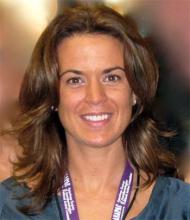In late May I had the pleasure of interviewing Carie Twichell, CAA. Ms. Twichell recently began her presidency of the American Academy of Anesthesiologist Assistants (the Certified Anesthesiologist Assistant professional organization) in which she has been an active member since the beginning of her career.
Born in Ann Arbor, Michigan, Carie’s mom worked for Chrysler and was transferred to Cleveland when Carie was in third grade. Carie did her freshman year of college at Michigan State and then switched to Ohio State to finish her undergraduate degree. She is married to husband Eric and they have 2 children, Izzy (Isabelle) 9 and Jack, who is almost 6. Ms. Twichell has worked at MetroHealth for 8 years where she instructs Case Western Reserve University CAA students nearly every day. Prior to that, she worked at Christ Hospital in Cincinnati for 7 years. She is responsible for starting the Christ clinical rotation for CWRU CAA students. When we spoke in May the new AAAA president was anticipating a busy year of service to the profession in addition to her ongoing work as a clinician and an educator.
Laura Bishop (LB): Where did you do your undergraduate study and what degree did you get? What was your career plan as a freshman?
Carie Twichell (CT): Ohio State. I was first a pre-med and environmental science major. I wanted to be a surgeon.
LB: Why did you become a certified anesthesiologist assistant?
CT: Pure luck. Friends of my parents had a daughter who was a student in the CWRU MSA program. We met, talked and she gave me a brochure. I was sold immediately. I applied and never looked back.
LB: Why did you want to attend CWRU?
CT: Small class size; I knew I’d get in-depth attention from my instructors. I also loved the hands-on aspect.
LB: Tell me about a great memory from your student experience.
CT: First day of intubating all by myself. Nervous, shaking and exhilarating!
LB: What word or phrase best describes the CAA profession?
CT: Integrity. I recognize that even more, now that I’m involved in the political side of things. Even when we argue for the CAA profession we don’t bash Certified Registered Nurse Anesthetists (CRNAs). We just state the facts.
LB: What do you want to achieve as a CAA? You’re now the president of the AAAA, so maybe you’ve reached an important goal?
CT: I graduated in a class with Gary (Jones) and Shane (Angus). I feel like a slacker! It’s all very relative.
[Gary Jones was formerly Program Director of CWRU MSA Houston; Shane Angus currently holds the same position at CWRU MSA DC. They are both practicing CAAs as well.]
CT (continued): What do I want to accomplish? I want to be a better clinical instructor. There are people who have this great connection with our students. Sometimes at the end of a day teaching, I think “Yeah, that went well”. Other days I look back and think, “I could have done better”. I want to learn to be a better communicator. Our students are so smart. Sometimes they’ll ask me something and I don’t know the answer. I have to say, “I don’t know, that’s a good thing to look up. Find out, write it up and send it to me. Then we’ll both know.” It’s really exciting to learn from them; they’re so curious and they want all the answers. Medicine changes constantly. New drugs are introduced all the time. You have to keep learning.
LB: What influenced you most during your time at CWRU?
CT: The clinical experience influenced me most. I learn best by seeing and doing, so the program fit me like a glove. I had so many opportunities to learn.
LB: Which clinical instructor really made a difference to who you are today?
CT: I’m a huge Pete Kaluszyk fan and a huge Joe Rifici fan. Pete came to my wedding reception + kept in touch with me. Dale Cuthbertson was a great teacher for me as a first-year student. We spent half our summer at Metro and half at UH. I started at Metro, so it became home and it’s apropos that I’m working there now. Dale told me, “I want you to get comfortable in this setting and comfortable in your skin. This is a new skin, different than you’ve ever had before.” That experience along with others like with people like George Yung, who went into such incredible detail. A combination of UH and Metro is really good.
LB: In one word, describe your impression of a CWRU MSA graduate.
CT: Proficient. Competent. Prepared. “Put me in”.
LB: What aspect of your CWRU education gave you the biggest advantage as a CAA?
CT: Clinical experience. The professionalism modeled by CWRU instructors and leadership. The leaders of all the national organizations taught us; and many of them are CWRU alumni, too. We’re so lucky.


